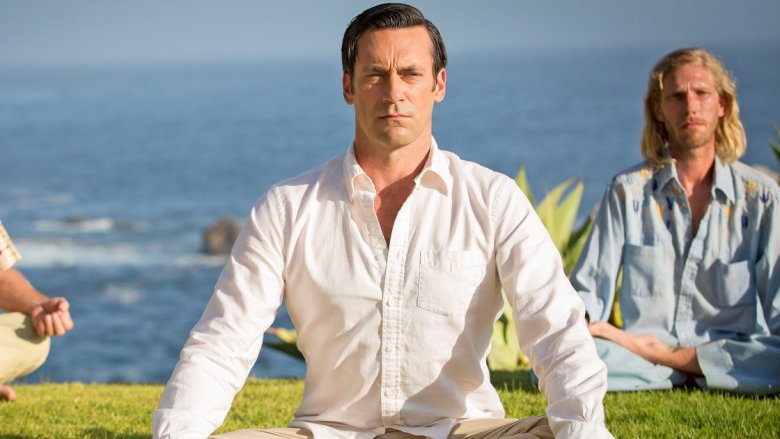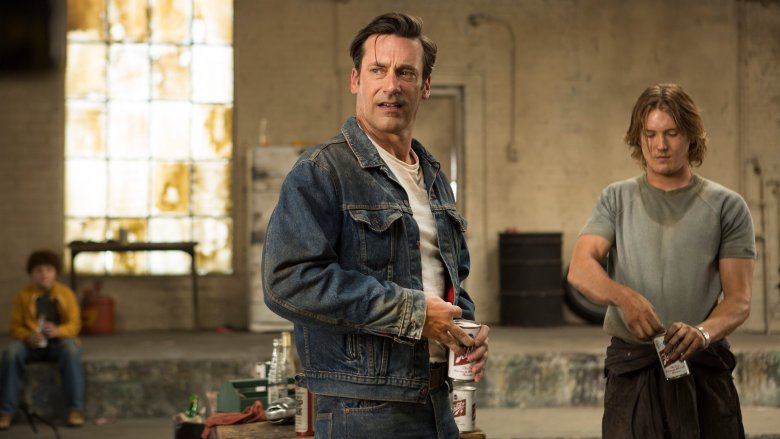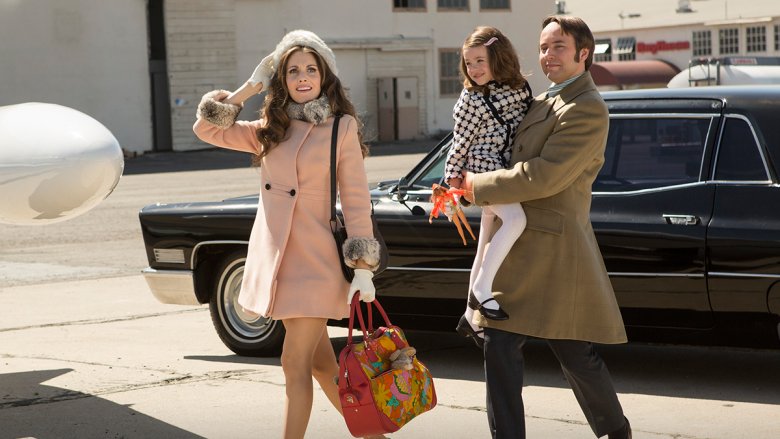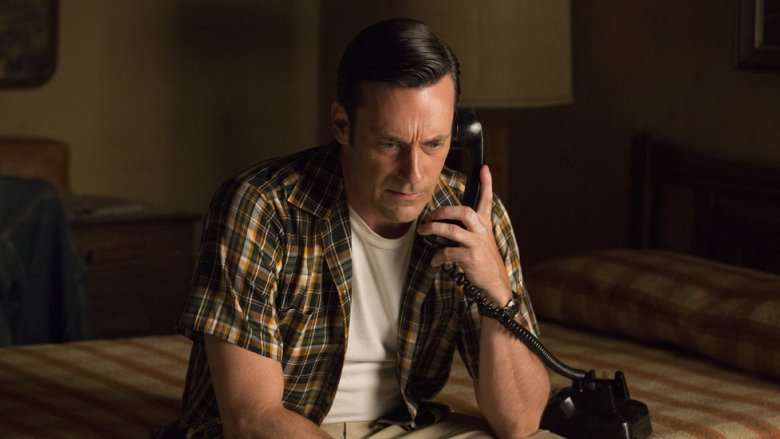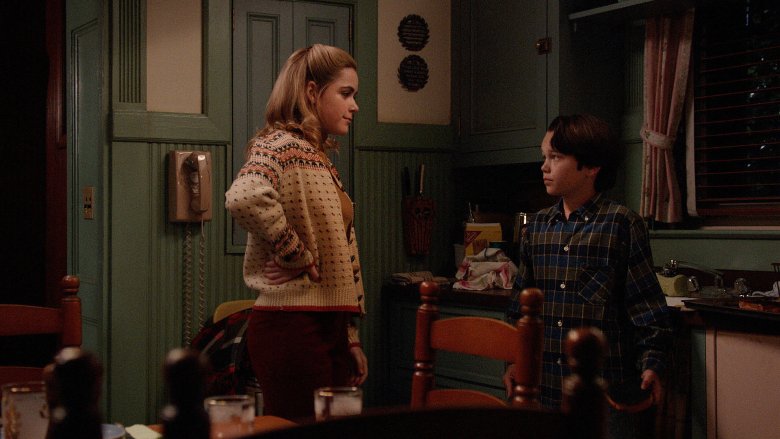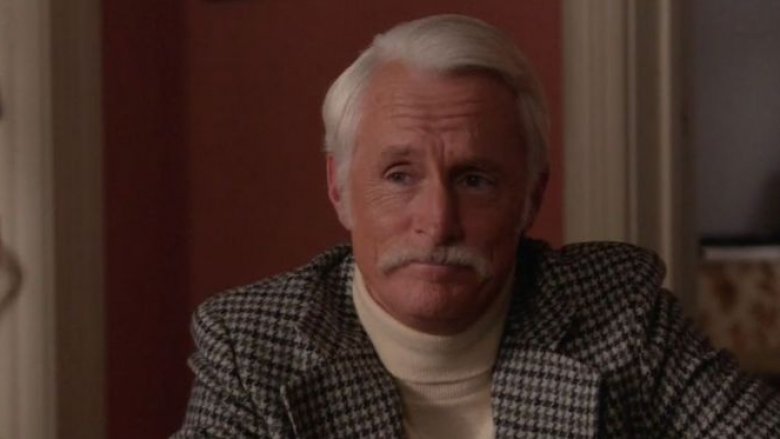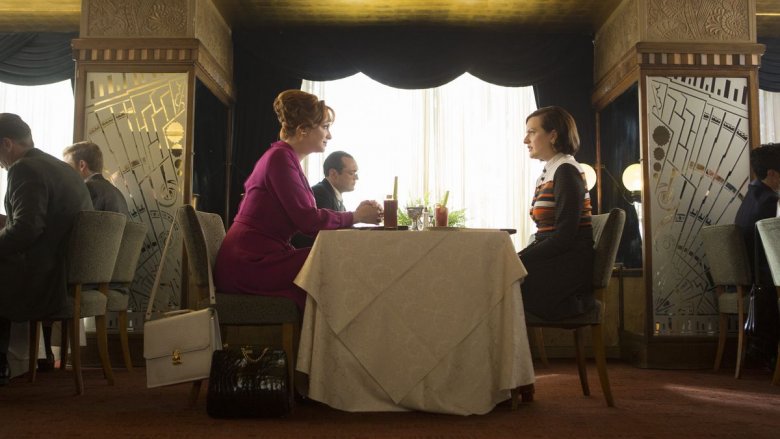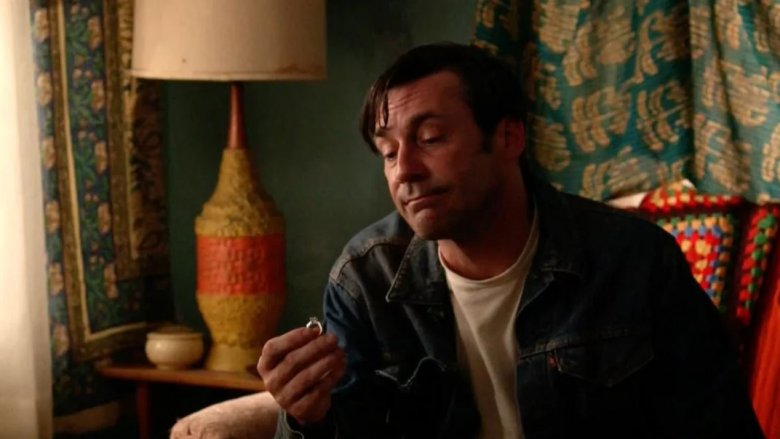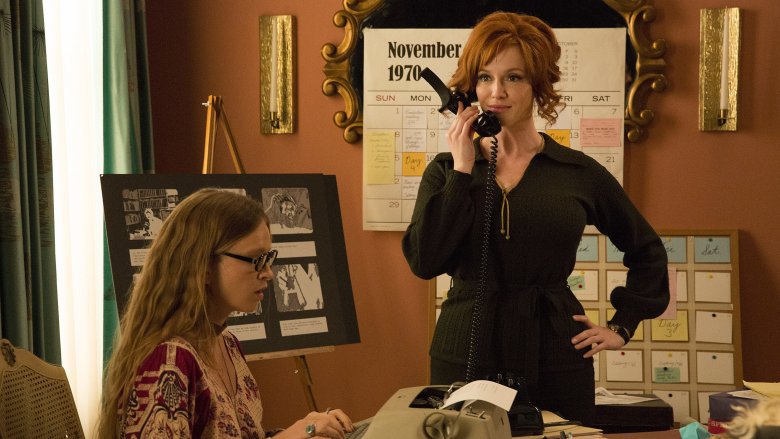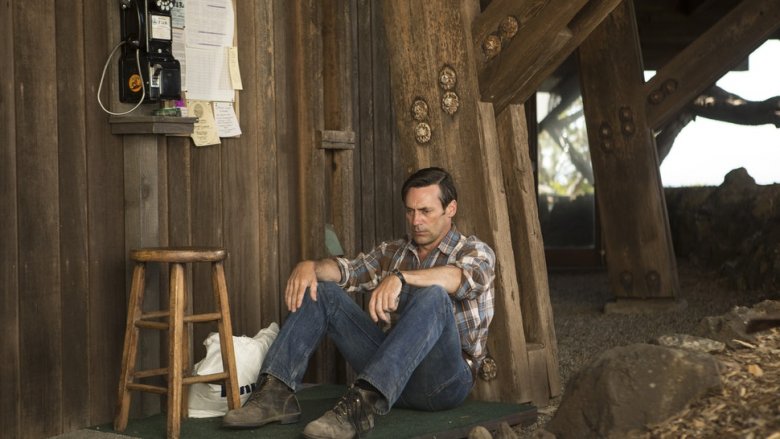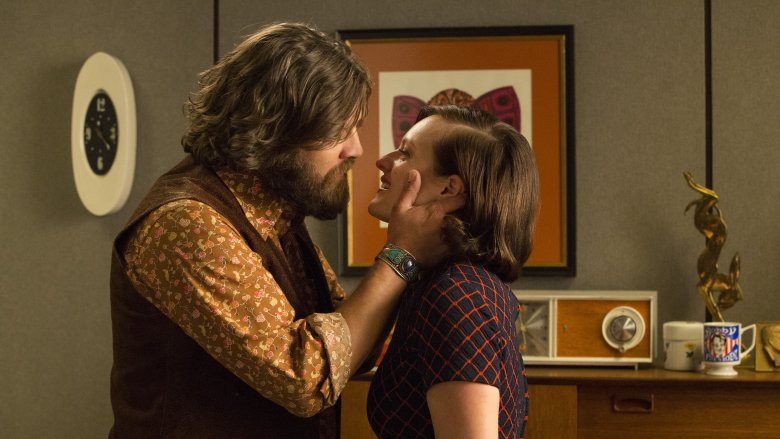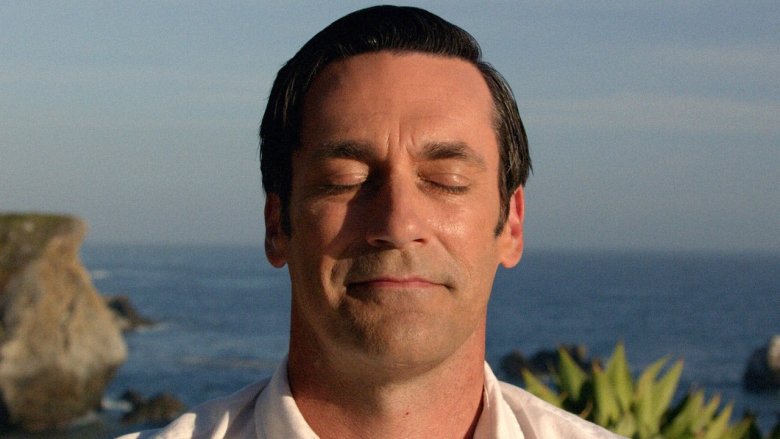We Finally Understand The Ending Of Mad Men
It's hard to believe that it's already been four years since Mad Men signed off for good with its series finale, "Person to Person," and we've been trying our best to understand the ending of Mad Men ever since. The series is one of the most acclaimed dramas of all time, boasting a record-tying four consecutive Outstanding Drama Emmy wins. With such an esteemed pedigree, there were a lot of high expectations for its finale. And like the series closer of the similarly-lauded The Sopranos before it, a lot of people didn't know what to think when the finale of Mad Men first aired. Was it good? Was it bad? Or was it just confusing?
Although Mad Men's ending wasn't quite as ambiguous as The Sopranos' closer, the final scene of "Person to Person" was still somewhat open to interpretation. Ending a popular and critically-beloved show like Mad Men after eight years on the air was never going to be an easy task, and it would've been impossible for the show to have come up with a finale that would satisfy all of its fans and critics. But the years have been kind to the show's finale, and in spite of the polarizing reaction it caused when it first aired, we now feel confident in saying that we finally understand the ending of Mad Men.
Don Draper searches for meaning in Mad Men's ending
Two episodes prior to the finale in the installment "Lost Horizon," Don Draper decides to take a road trip. He does so after attending a pitch meeting at his company's new home of advertising giant McCann Erickson, where he feels lost, irrelevant, and uninterested. Don exits the meeting shortly after it begins, gets in his car, and just starts driving without telling anyone where he's going. By the time we get to the start of the finale, Don has made it to Utah where he's taken up racing cars across the desert. Having been inspired after witnessing Gary Gabelich break the land speed record, Don pledges to stake a group of youths who are building a race car. It's miles away — both literally and figuratively — from where we're used to seeing Don. His gray wool suit has been replaced by a Canadian tuxedo as he embraces his grease monkey side.
This distance between Don's usual self and his road trip persona is deliberate. He no longer felt like he belonged in the advertising world of New York, and so he's on a mission to find out where his place in the world is. He figures out soon enough that his destiny isn't to break the land speed record in the Utah desert, but he's going to keep searching for meaning wherever he can find it, regardless.
Pete completes his redemptive arc
Pete Campbell only shows up in just two short scenes in the finale, but they're both essential to his overall character arc and undoubtedly showcase the character at his most likable. Throughout most of Mad Men's run, Pete was 100 percent hateable. He was smug and selfish like Don, but he lacked the effortless cool and wry sense of humor that helped to smooth out Don's rough edges. One could even argue — convincingly — that the most satisfying scene in the entire series was when Lane Pryce punched out Pete in season five.
But as Mad Men wrapped up, Pete underwent a transformation. He'd learned a lot over the years, and whether it was due to age, experience, or a combination of both, Pete became a better man. In the episodes leading up to the finale, Pete managed to patch things up with his ex-wife Trudy, reuniting their family for the first time in years. He also took a new job with Learjet that would require he and his family to move to quiet Kansas, where they would start their new life together. Pete's redemptive arc finally completes in the finale, in a scene where he says goodbye to Peggy. He's all smiles and has no ulterior motive, and he simply comes off as someone saying farewell to an old friend. It's a complete 180 from his lewd first encounters with Peggy in the series' premiere, and it shows just how much Pete has grown as a person.
Don finally realizes he's been a terrible father
Don's fun in the desert sun is interrupted when reality re-enters the picture. He calls his daughter Sally to excitedly tell her about his adventures, but she's wholly uninterested in hearing about them. She tells her father that Betty, her mother and Don's ex-wife, has been diagnosed with terminal lung cancer. Don immediately declares that he will return to New York and have Sally and her two younger brothers move in with him, but Sally discourages him from doing so.
Undeterred, Don calls Betty and tells her the same thing. They're his kids so he ought to be the one to raise them. Well, that's Don's reasoning, anyway. Betty, who's seeing things more clearly as she marches closer to her death, wants the children to move in with her brother and his wife so they can have stability. She reminds Don that he's never been a father to his children, and even when he had opportunities to see them, he would usually forego them.
After speaking with Betty, it finally hits Don that he's not the family man he'd built himself up to be in his head. His kids don't want to be with him, and even though he may have said so, his actions have proven that he doesn't want to be with them either. They lead completely separate lives, and this realization — especially since he himself had grown up without parents — hits Don especially hard.
The Draper kids are going to be all right
Even though Betty is dying and Don is effectively out of their lives, we still get the feeling that the Draper kids — Sally, Bobby, and Gene — are going to be all right. Sally, desperate to not become either one of her parents, is forced to grow up more quickly than she probably would've liked to. In the finale, after speaking with her father on the phone, the eldest Draper child surprisingly returns home from boarding school — canceling a trip abroad to do so — to help raise her two younger brothers. As Sally enters the kitchen of the Francis residence, and after telling Gene to leave the room, she has a brief discussion with Bobby about their mother's health. Although Bobby hasn't been briefed on Betty's illness, he knows she's dying, and has himself been trying to pick up the slack around the house. He's just failed at cooking dinner as Sally enters, and she decides to show him how it's done.
The final shot of Sally in the finale is of her washing dishes while Betty smokes at the kitchen table. It's obvious by this point that Sally is determined to give her brothers a proper upbringing, and that despite the best efforts of Betty and Don, she's turned out to be a loving and caring person who prioritizes family. Sally has a good head on her shoulders and is going to be all right, and thanks mostly to her, her brothers are going to be okay, too.
Roger begins his final chapter
The hilarious Roger Sterling didn't have a lot to do in the Mad Men series finale, as his storyline had largely wrapped up by that point. His biggest contribution in the seventh season, and his final grand act, was orchestrating the sale of Sterling Cooper & Partners to McCann Erickson. An older man with no roots at his new company, Roger didn't have much of a value to McCann, and he knew it. He wasn't the company's future, and in his mind, he didn't have much of a future at all. In the finale, he claims to be entering the final chapter of his life, and surprisingly, he seems quite okay with it.
Rogers "final chapter" involves him getting his finances in order and learning to love again. He visits his old flame, Joan Holloway Harris, but it's not to try and rekindle any romance. Instead, he's there to tell her that when he dies, he'll be leaving a substantial portion of his fortune to Kevin, the secret son they share together. Joan resists the offer, but Roger insists, claiming it will be done in such a way as to not arouse suspicion about the kid's true parentage. Roger also declares his intention to marry Megan Draper's mother, Marie, and the last we see of Roger, he's having a ball in Paris with his new bride.
Peggy and Joan are at a crossroads in Mad Men's ending
When the finale begins, Peggy Olson and Joan Holloway Harris find themselves in completely opposite situations. Joan is living it up in Florida with her wealthy new beau, Richard, enjoying her pseudo-retirement without a care in the world. Peggy, meanwhile, is struggling to gain respect at her new home of McCann, and she finds herself fighting for the smallest of concessions. As the episode progresses, it becomes clear that each of them are unsure of which direction they want to take in their lives. But after having dinner with her former colleague, Ken Cosgrove, Joan believes she has the answer for both of them.
Ken asks Joan to produce an industrial film for his company, and Joan decides to hire Peggy to write the script for the project. Peggy is reluctant initially, but after hearing how much money is involved, she agrees. The project goes swimmingly, and Joan is able to secure more contracts for similar work. Realizing how much she's missed working, Joan gets the idea to start her own industrial film production business. Peggy, meanwhile, is increasingly upset with her position at McCann, so when Joan asks her to be her partner in the new business, it's something she seriously considers. As the two main female characters of the series, Joan and Peggy took very different paths to reach their respective points in the finale, but it makes sense that their futures would potentially be so tied to one another when it was all said and done.
Don is rejected and finds himself alone
After effectively being cut out of his family's life, Don heads to Los Angeles to look up the only family he thinks he has left. As part of his convoluted backstory, Don — or rather, Dick Whitman — had long ago befriended Anna Draper, the widow of the real Don Draper whose identity Dick/Don stole during the Korean War. Anna remained Don's closest friend and confidant until her death in season four, and by proxy, Don also became close with Anna's adult niece, Stephanie. Don shows up at her house in L.A., dreadfully hungover and depressed, hoping to find some comfort, but Stephanie isn't doing so hot herself. Having just given up her baby and feeling lost, she's about to head to a hippie retreat on the California coast. Don, having nothing better to do, decides to go with her.
Upon arriving at the retreat, Don is instantly put off by the New Age shenanigans that he sees. He may be trying to discover who he is, but he remains a conservative, strait-laced guy, and he gives off the impression that he thinks the entire retreat is silly. After Stephanie is criticized by fellow retreat goers for giving up her baby, Don attempts to console her and is met with hostility. Stephanie asks him what he's even doing there, telling him that he's not her family. She then takes Don's car in the middle of the night, leaving him alone in every possible way.
Joan makes her choice
Throughout most of Mad Men's final episode, Joan was trying to have it all. She wanted her carefree relationship with Richard, but she also missed working, and she was excited about the prospect of starting her own business. It all comes to a head when Richard calls her out on her career aspirations, essentially asking her to choose between him and her fledgling business. Joan refuses to choose, but by doing so, she effectively chooses the business. Richard wishes her luck and literally walks out of her life, leaving Joan single and ready to mingle — with businesses that need industrial videos, that is.
Joan ending her arc as a career woman in charge of her own business has to be one of the series' most satisfying endings. At the show's start, Joan's dream was to get married, have a family, and move to the suburbs where her wealthy husband would take care of her. But this was never really her dream. It was simply what the society of the time — pushed by the very ad agencies for whom she worked — had told her she desired. And after years of being doubted, pushed around, and sexually harassed by the men in her life, Joan ultimately decides to be her own woman, charting her own course to succeed or fail on her own.
Don breaks down and says goodbye
Upon learning that Stephanie has left, Don suffers a complete and total breakdown. Alone and abandoned in a strange place, Don silently reflects on all he's lost. He's walked away from his career, feeling like he no longer belonged there. He's recently split up with his wife, Megan, who wants nothing to do with him, and his first ex-wife, Betty, is dying and also wants nothing to do with him. He's effectively had his taken his kids taken away from him — though by now, he's realized that he never really had them to begin with. And now, to top it all off, he's been left by the last vestige of what he thought was his true family, only now realizing that his connection to Stephanie was merely an illusion.
In this desperate place, Don calls the only person in the world who he thinks might care about him: Peggy Olson. After initially lashing out at Don for taking off without telling anyone where he was going, Don's former mentee changes her tune once Don starts crying and lamenting about all the mistakes he's made in his life. Peggy tries to talk him down, fearing that he may be suicidal — thoughts that aren't helped by Don saying that he's calling her to say goodbye and ending the call by saying he just wanted to hear her voice. We've seen Don break down before but not like this. This is truly a man at the end of his rope.
Peggy comes to a realization
Peggy is naturally freaked out over her conversation with Don. Stan Rizzo shows up to console her, saying that Don always takes off without telling anyone and that he'll eventually return, but Peggy remains unconvinced that Don is going to be okay. That is, until Stan presents her with a mammoth distraction in the form of telling her that he loves her. Stan's declaration of his feelings takes Peggy by surprise, and it takes her a while to even comprehend what he's saying. After all, she'd been thinking about a lot lately: her status at McCann, whether or not she should take Joan's offer of a partnership, and now whether her boss was going to be all right, but she'd never taken the time to think about her personal life.
Earlier in the episode, Stan had told Peggy that work isn't everything, and now Peggy can finally see what he was talking about. When she takes a moment to think about it, to focus on what she actually wants, Peggy realizes that she loves Stan, too. The two embrace in what is easily the finale's biggest moment of fan service, but that doesn't make it any less satisfying. After all, Peggy deserves to be happy, and if turning down Joan's offer and dating Stan is what makes her happy, then more power to you, Miss Olson.
Don discovers his true purpose in the ending of Mad Men
After speaking with Peggy, Don sits alone, staring into space until a member of the retreat comes along and invites him to sit in on a group session. While Don is hostile toward the idea at first, he quickly realizes that he has nothing else to do and relents. During the session, a suburban father, roughly Don's age, has his own tearful breakdown while describing how no one in his life appreciates him — not his family, not his colleagues, no one. Don sees himself in the man and embraces him, with the two of them holding each other and sobbing uncontrollably together.
The following morning, Don attends a group meditation outdoors. No longer appearing cynical or broken down, Don "ohms" along with the rest of the group before the faintest hint of a smile creeps across his face. The episode then cuts to McCann's famous "I'd Like to Buy the World a Coke" ad, with the implication being that Don conceived the ad in that moment.
So what's going on here? Well, Don has finally realized his true purpose. After pushing away his advertising career in pursuit of finding meaning elsewhere, it takes Don losing everything to realize that he's an ad man through and through. After all of the pain and anguish he felt at the commune, the fact that he's still able to exploit hippie culture to sell soda just proves that there's only one thing on this Earth that Don Draper was meant to do.
